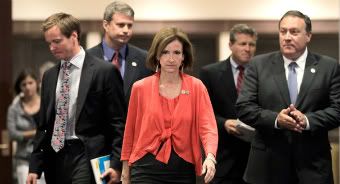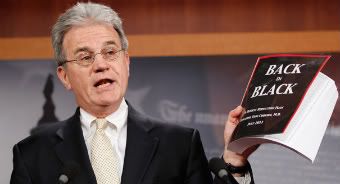"Huh?" Everything You Need to Know About the Debt-Ceiling, July 17-23
By
Kyle Andrejczyk
Posted:
 We left off last week with the White House talks crumbling, the GOP rallying around the sure-to-fail Cut, Cap & Balance Act, and Sen. Mitch McConnell's “last ditch” plan gaining traction, at least in the Senate.
We left off last week with the White House talks crumbling, the GOP rallying around the sure-to-fail Cut, Cap & Balance Act, and Sen. Mitch McConnell's “last ditch” plan gaining traction, at least in the Senate.
Here's what's happening this week with the debt-ceiling (and if you have time check out out this op-ed from Joe Scarborough, even if you don't agree with his politics he has some great insights on the topic):
Sunday, July 17
- House Speaker John Boehner and House Minority Leader Eric Cantor meet with President Obama at the White House. Boehner's office later states that meeting was to keep the lines of communication open, not set a legislative agenda for the week.
Monday, July 18
- The stock market drops amid fears that Congress will fail to raise the debt-ceiling, the United States will default on its debt, and the country's credit rating will be downgraded.
- The GOP appears divided on the McConnell-Reid plan, which would essentially give President Obama unilateral authority to raise the debt-ceiling while allowing Republican to wash their hands of the whole matter (some might even use the word abdicate). Opposition to the plan is coming mostly from the conservative right who would not like to seen any increase in the debt-ceiling, although the plan has been widely criticized as doing too little to reduce the deficit and simply “kicks the can down the road.”
- The White House officially announces that it will veto any Cut, Cap, and Balance Act that reaches the President's desk.
- Billionaire investor Warren Buffet asks “why even bother having a debt-ceiling?”
- Sen. Tom Coburn unveils a $9 trillion deficit-reduction proposal that includes $1T in new revenues, $1T in cuts to the Pentagon, $2.64T in cuts to Medicare/Medicaid, and and gradually raising the retirement age to 69 by 2077.
Tuesday, July 19
- House Speaker John Boehner urges Republicans to unanimously vote in favor of a Cut, Cap, and Balance Act, which at this point may not even pass the Republican-dominated House. The Act has no chance of passing in the Senate and is being seen simply as a way for Republican legislators to go on record as being hard-line fiscal budget hawks.
- GAMECHANGER: Sen. Tom Coburn rejoins the Gang of Six. Senate rallies around $3.7T deficit-reduction plan that includes closing tax loopholes, major tax code restructuring, entitlement reform, and savings in healthcare. You can read the plan here.
- At a press briefing, President Obama voices support for the Gang of Six plan, calling it a “very significant step forward.” He also endorses the McConnell-Reid plan as a fail-safe option.
- President Obama also said he'll ask Congressional leaders to return to the White House "in the next few days" to reconvene debt-ceiling negotiations.
- Late this afternoon, top Senate Democrats say the Gang of Six plan won't be drafted in time for the August 2 debt-ceiling deadline. Parliamentary rules also dictate that the plan must first be approved by the House since it will raise revenues (taxes). Elements of the package could make it into a final deal to raise the debt limit, and it could lay the groundwork for a major deficit-reduction package later this year.
- John Boehner says that the Gang of Six plan “appears to fall short” of goals set by House Republicans. Eric Cantor, House Budget Committee Chairman, gives the plan a mixed review, highlighting that the plan does not do enough to address healthcare costs. These critiques highlight the how difficult it will be to garner the necessary 218 votes for the plan to pass in the House.
- House Democrats also voice opposition to the McConnell-Reid fallback plan, characterizing it as a political ruse intended to scapegoat Democrats and taint them at the polls. Combined with disapproval from the right, the McConnell-Reid plan is facing grim prospects in the House.
- The Republican controlled House passes a Cut, Cap, and Balance Act that includes a balanced budget amendment. The measure passes along a party line vote of 234-190. The Act is expected to fail in the Senate.
Wednesday, July 20
- Harry Reid says the Senate has a "path forward" for raising the debt ceiling but said he's waiting on Speaker John Boehner to tell him what can pass the House. Reid is mostly likely referring to the "fallback plan" he and Sen. Mitch McConnell have been drafting, along with certain aspects of the Gang of Six plan.
- Gang of Six member Sen. Mark Warner plans to brief a group of House Democrats on the Gang's plan. The business-friendly New Democrat coalition will be one of the easiest factions in the House to sell on the plan.
- President Obama meets with Congressional leaders late afternoon to "talk turkey." No other WH meetings have been scheduled.
- 33 Senators, including 15 Republicans, have signed on to the Gang of Six plan. Even some Tea Party Senators are receptive to the plan. However, the plan is being met with resistance by House GOP, who are increasingly being viewed unwilling to engage in bipartisan compromise.
- In any case, the Gang's plan is still just a rough outline and Senate leaders say there is not enough time to draft the legislation and have it enacted into law by August 2. This highlights the need for a short-term deal to raise the debt-ceiling. The White House is shifting its stance on the subject, after previously threatening to veto any short-term deal.
- The McConnell-Reid fallback plan, which will reportedly include $1.5T in spending cuts, is a growing source of tension between the Senate and the House, and between Republicans in particular. The White House is seeking a $2.5T raise to the debt-ceiling, but House GOP say any debt-ceiling hike must be offset with dollar-for-dollar spending cuts. So a plan that only cuts $1.5T should only be met with a $1.5T raise.
- The Pentagon braces for deep cuts as more lawmakers float ideas about cutting defense spending in debt deal.
Thursday, July 21
- Sen. Kent Conrad, member of the Gang of Six, voices his support for a 6 month debt-ceiling increase. The senator views the 6 month interim as a "down payment" to allow for the Gang's deficit reduction plan to be fleshed out and enacted into law. The Gang of Six and its supporters have warned there is simply not enough time to enact the plan by August 2.
- Some folks on Wall Street are confident that Washington will strike a deal and the United States will default on its debt. Others not so sure.
- In a closed-door meeting, House Republicans are warned by credit rating agency officials that a debt default would send markets into a "death spiral." Members who attended the meeting later said "death spiral" isn't as bad as it sounds. (Uhhh, what?)

Rep. Nan Hayworth (R-NY) and several other House members totally looking like didn't just hear terrible news.
- Rumors circulate that The White House and Republican leaders are moving closer to a debt-ceiling deal that would involve spending cuts and entitlement reform, but push tax reform and possible revenue increases off to next year. Top Democratic leaders are outraged at these clandestine developments and insist revenue increases must be apart of the deal.
- The White House and John Boehner both deny that any deal has been made, but Democrat leaders are still incensed.
- Democratic Congressional leaders head back to the White House to meet with President Obama.
Friday, July 22
- Treasury Secretary Timothy Geithner meets with current and former officials who have dealt with past financial crises, including Henry Paulson, Treasury Secretary under George W Bush.
- John Boehner blast Senate Dems, President in an an afternoon floor speech for failing to produce a plan to cut the nation's debt.
- GAMECHANGER: Late in the day, John Boehner pulls the Republican conference out of debt-ceiling negotiations with the White House, citing the White House abandoned an agreed upon number for a revenue increase and was insisting on tax hikes. It was reported that Obama and Boehner were on the verge of striking a deal. Boehner makes the announcement at 6pm, well after U.S. financial markets have closed for the day. Read his letter to the President here.
- In an evening press conference, President Obama says "we have run out of time," and fires back at Republicans saying "at some point, I think if you want to be a leader, then you got to lead." The President calls on leaders of Congress to return to the White House for a Saturday morning meeting.
Saturday, July 23
- An 11am meeting with Congressional leaders at the White House lasts but an hour, bringing a possible deal no closer to fruition. The onus for getting deal done now rests solely on Congress. Although President Obama did reassert that he would refuse any short-term hike to the debt-ceiling, seeking an extension through the end of 2012.
- Democrat leaders Harry Reid & Nancy Pelosi met with Republicans John Boehner & Mitch McConnell Saturday in a Congressional office. Although no deal was struck, there is some indication that any debt-deal might have to come in a two-tiered approach: some immediate spending cuts along with a process for Congress to address entitlement tax reforms later. This approach would be at odds with the demands of the President and many Congressional Democrats.
Thoughts on the Week
- The much celebrated Gang of Six plan seems moot right now. Not for fault of its own, the political landscape has simply shifted around it.
- The White House has been sidelined in the negotiations: a blow to President Obama's standing on the issue.
- The onus is now on Congress for raising the debt-ceiling.
- As much as it might pain the President, it seems that his idea for a grand bargain is slipping away to be replaced by short-term deal that (at best) will push tax and entitlement reform down the road.
- The reasoning for this is partly political and partly practical. As the repeated breakdowns in the talks demonstrate, Congress simply isn't going to reach an agreement and draft legislation to deal with all this by August 2. And by pushing these tough votes into next year (election season), the GOP hopes to put more heat on Obama...that or just avoid the votes altogether.
- If these votes are going to happen, Congress MUST create a process that will obligate them to tackle taxes and entitlements. Simply saying they will won't be enough, especially with next year's election.
- If Congress does create a process for addressing these larger issues, the Gang of Six plan could come back into play in a big way.
- The McConnell-Reid "last-ditch" plan is still unpopular among House GOP, seems less likely to pass than the two-tiered approach now being floated.
Looking Ahead: An agreement to raise the debt-ceiling must be hammered out between the House and Senate leadership.
Check back with National Priorities Project as the debt talks continue, "like" us on Facebook, or follow us on Twitter @natpriorities.
LAST UPDATED: MONDAY, JULY 25, 11:00am
* * * * * * * * * * * *
Want to “Ask Kyle” a question on this or anything else? Send it to questions@nationalpriorities.org or post your “Ask Kyle” questions on Facebook at facebook.com/nationalpriorities.
